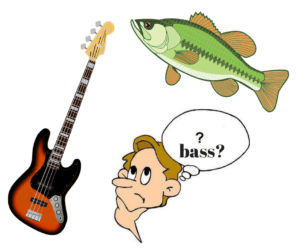What are Heteronyms? – Introduction
 This post answers the question, “What are heteronyms?” and gives some everyday examples.
This post answers the question, “What are heteronyms?” and gives some everyday examples.
In a previous post, we looked at some fun English intonation examples, in which the sentence meaning changed, based on which word was emphasised.
Heteronyms are individual words can have different meanings, based on which syllable is emphasised, or how the word is pronounced.
I know that a lot of people prefer their content in video format, so if that’s you, please enjoy this accompanying video. It’s a great way to actually hear the differences that are mentioned in this article
Noun or Verb?
There are many topics in English where you learn a rule and then you learn the many exceptions to that rule. This can be frustrating for learners.
Here is some good news, as this is one topic where the rule holds, without a huge exceptions list.
Here’s the rule: if the stress is on the first syllable, it’s a noun and if it’s on the second syllable, it’s a verb.
Some examples:
- to record a record
- to present a present
- to contest a contest
- to rebel like a rebel
- to produce produce
- to object to an object
- to subject the subject to tests
- to insult with an insult
There are many more, but this list shows the idea.
Upper Case or Lower Case?
One group of heteronyms are when one word is capitalised and the other is all lower case.
Some purists might argue that these are not true heteronyms, as the spelling is not exactly the same.
- Reading, the town in England – reading, as in a book
- Seat, the car manufacturer – seat, something to sit on
- Job, a biblical character – job, as in employment
- August, the month – august, meaning important
- Nice, a French town – nice, as in pleasant
- Worms, a German town – worms, the plural of worm
- Said, an Egyptian town – said, past form of to say
Other Heteronyms
In addition to the noun or verb examples above, there are many other words where the different meanings are totally unrelated.
Some examples will show you what I mean:
- sow, a female pig – sow, seeds in the ground
- sewer, someone who sews – sewer, where the waste goes
- bass, a fish – bass, a guitar
- wound, an injury – wound, past form of wind
- wind, to wrap around – wind, good for flying a kite
- dove, a bird – dove, past form of dive
- does, 3rd person singular of to do – does, plural of female deer
- minute, very small – minute, 60 seconds
See what I mean about the different meanings?
False Heteronyms
There are words that have different meanings, based on context.
However, a true heteronym has to actually sound different: that’s the ‘hetero’ part of the word. The correct term for this is homonym.
Here are a few examples:
- dust – verb (to clean) and noun (the dirt)
- dry – verb (to remove water) and adjective (meaning not wet, or not sweet)
- face – noun (front of your head) and verb (to deal with)
- down – adverb (opposite of up) and verb (to drink quickly)
- chair – noun (something to sit on) and verb (to run a meeting)
There are hundreds of these, but I hope that these examples illustrate the point.
A Silly Example

In England, and probably other countries as well, you will often see a “Polish Shop”, which is a shop full of items and foods from Poland. Polish immigrants as well as fans of this fine culture and delicious cuisine shop there.
I’m always tempted to go in and ask if they have something to bring out the grain and shine up a teak table.
So far, I’ve been able to resist this childish urge, but who knows what tomorrow will bring?
What are Heteronyms? – Summary
Heteronyms can make life difficult for the language learner, as it isn’t always clear which version is meant.
If this post makes you curious to know more, check out this Wikipedia page.
If you have any questions or comments, please use the comments section to ask or tell.


